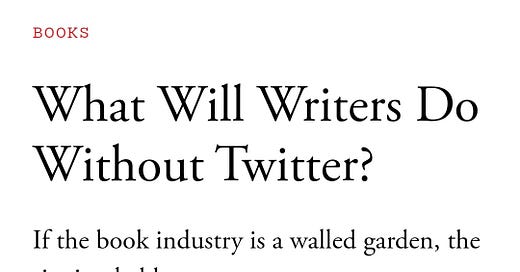I Assure You, Writers Would Be Fine Without Twitter
and Twitter is probably not going anywhere
So: I don’t think Twitter is going anywhere, and I don’t think the vast majority of Twitter users are going anywhere. The whole notion of the death of Twitter seems like a minor tantrum that will probably blow over in time, and the people who are making grand declarations about how they’ll leave because of Elon Musk are the same sort of people who are deeply addicted to the service. I could be wrong. But I would bet good money that one week/one month/three months from now, Twitter will be operating at full capacity with more or less the same user base. The catastrophizing seems pointless, to me.
That being said, if Twitter were to disappear tomorrow, I assure you that writing and writers would be fine. Thinking of “writer Twitter” as more important than writers themselves is an insult to the profession. People have been trading words for money for thousands of years. They will continue to do so after the death of a platform built on manufactured outrage, social hierarchy, unfunny jokes, stale memes, pornography, and spam. I mention this Atlantic essay only because it echoes what so many people are saying in the ether right now, not to pick on its author. The piece reads like a parody of how writers overestimate the importance of Twitter to their work and careers. It’s frankly a little embarrassing. Your work is the product you sell! Not the shitty jokes you tell with people you want to impress. Erin Somers goes hard on the ability of Twitter to generate interest, but we’ve known for many years that Twitter does not drive traffic. (Ironically, Somers endorses a misconception held by Elon Musk.) Says Somers,
I worry for the writers who are just beginning, especially the outsiders. How will they break in? Up in New Hampshire or some other far-flung outpost, a young writer is about to have a bad winter, and what will she do?
Such a writer could do what I’ve done. I didn’t have a Twitter account for the first six years of my writing career. I haven’t had one in the past five. I’ll put my list of publications up against anyone’s. This newsletter makes me a very good living. I do developmental editing and ghostwriting. I have recently signed a big-money book contract with Simon & Schuster. My freelancing career is flourishing. If this sort of thing matters to you, I was published in the New York Times again a year ago and appeared on NPR this summer. I understand that it sounds like I’m bragging, but I don’t know how else to refute the notion that Twitter is essential to a writing career. This newsletter has an automated Twitter feed that shares its posts, but that’s all it does, and I don’t even have the login credentials. It has less than 1,500 followers. I’m fine.
No, what could potentially die with Twitter isn’t professional success as a writer. What could potentially die is the ugly, vicious, bankrupt popularity hierarchy on Twitter that so many writers are caught up in. That is what organizes writers on Twitter, not ability or quality of work or marketability but esteem among peers. And that esteem is, in general, dictated by conformity, a willingness to defer to the more popular, performative enjoyment of other people’s jokes, and all manner of other things that have nothing to do with the actual quality of a writer’s work. I am the absolute last to suggest that the writing economy is a meritocracy - many brilliant writers struggle constantly for attention and professional opportunity. But I myself am proof that the idea that writers need to be on Twitter is wrong. Hell, Elena Ferrante is one of the world’s most acclaimed novelists, and she does not do promo at all. You can carve out your own path. I’ve had to, thanks to my own self-destructive behaviors and scandals I’ve brought upon myself.
Besides, Twitter’s not going anywhere. We should be so lucky.





As a longtime resident of Book World, I just saw Twitter making public the literary careerism, nepotism, capitalism, raging jealousy, and corruption that had always remained far more private.
You blasted off with a gazillion followers though. I have to build my substack incrementally. I know I have a good product based on high conversation and low churn rates, but with the exception of the occasional viral post at most I get one to two paid subs per post. They almost always come from Twitter. I don't even bother posting on FB anymore because I get no engagement. I don't think the end of Twitter would be the end of writing. Probably it'll improve people's writing not to doom scroll and bicker all day. And hopefully people can work together for a better way to promote their work.
But I wouldn't dismiss people's concern as just wanting to be part of online "media in group."